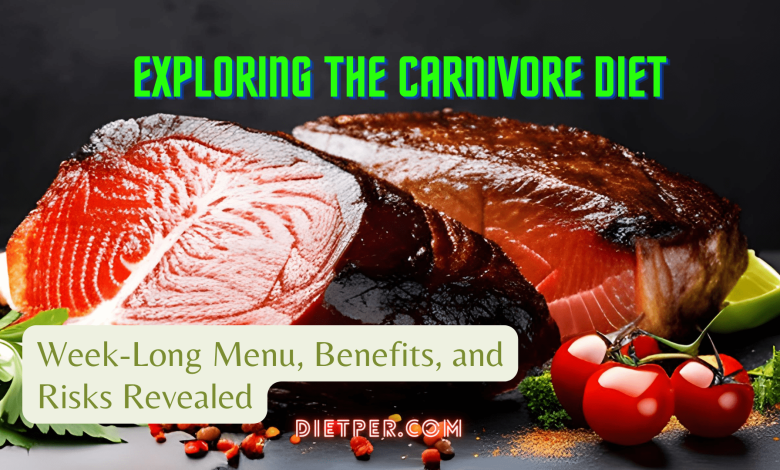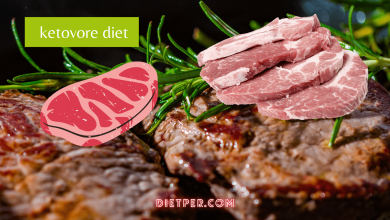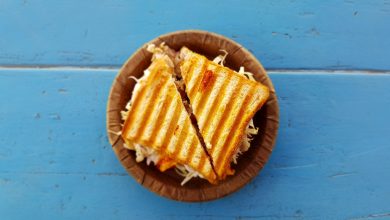Exploring the Carnivore Diet: A Week-Long Menu, Benefits, and Risks
Exploring the Carnivore Diet: A Week-Long Menu, Benefits, and Risks Revealed

Carnivore diet: The carnivore diet, also known as the zero-carb diet, is a trendy new eating plan that has been gaining popularity among health enthusiasts and those seeking a radical change to their diet. This diet involves consuming only animal products, such as meat, fish, eggs, and dairy while eliminating all plant-based foods. The carnivore diet plan offers many health benefits, including weight loss, improved digestion, and reduced inflammation. However, examining the potential risks and long-term effects of such a restricted diet is essential.
What Is the Carnivore Diet Exactly, and How Does It Work?
The carnivore diet has gained significant attention in recent years as a controversial and highly restrictive eating plan. Essentially, it is a dietary approach that involves consuming only animal products and eliminating all plant-based foods from your meals. This means that followers of the carnivore diet meal plan primarily consume meat, fish, eggs, and other animal-based products while excluding fruits, vegetables, grains, legumes, and even dairy.

The concept behind the carnivore diet meal plan is rooted in the belief that many health issues and autoimmune conditions are caused by consuming plant-based foods. By eliminating these carnivore diet food list diet proponents argue that you can alleviate symptoms and improve overall health.
In terms of how the carnivore diet works, it primarily revolves around the concept of ketosis. When you exclude carbohydrates and rely solely on animal-based foods, your body enters a state of ketosis, where it burns fat for fuel instead of relying on glucose from carbohydrates. This shift in metabolism is what some individuals credit for weight loss, increased energy levels, and improved mental clarity.
However, it is important to note that the carnivore diet is highly controversial and not supported by scientific evidence. Many nutrition experts and health organizations caution against its extreme nature and potential nutrient deficiencies. The diet lacks essential vitamins, minerals, fiber, and antioxidants from plant-based foods.
How to follow the carnivore diet plan?
Following the carnivore diet plan may seem like a radical concept to some, but it can be a game-changer for those seeking a simple approach to nutrition. If you’re considering adopting this meat-centric way of eating, it’s important to understand the basics of following the carnivore diet.
1. Understand the concept
Before diving into any diet, it’s essential to understand its principles and potential benefits. The carnivore diet emphasizes excluding all plant-based foods, including fruits, vegetables, grains, and legumes, focusing solely on animal-based products.
2. Plan your meals
To follow the carnivore diet meal plan successfully, planning your meals in advance is crucial. Make a list of animal-based foods that you enjoy and that fit within the diet guidelines. This could include various types of meat, poultry, fish, eggs, and full-fat dairy products.
3. Choose high-quality animal products
Since animal products are the foundation of the carnivore diet, it’s important to prioritize high-quality sources. Opt for grass-fed beef, pasture-raised eggs, wild-caught fish, and organic poultry whenever possible. These choices ensure that you get the most nutritional benefits from your food.
4. Experiment with different cooking methods
Explore different cooking methods for your animal-based foods to keep your meals varied and enjoyable. You can grill, bake, roast, or even try slow-cooking meats to add different flavors and textures to your meals.
5. Stay hydrated
While the carnivore diet doesn’t restrict water intake, staying adequately hydrated is essential. Drinking enough water helps support digestion, flush out toxins, and maintain overall health. Aim to drink at least eight glasses of water daily or more if needed.
6. Consider supplementation
With the elimination of plant-based foods, certain nutrients like fiber, vitamin C, and potassium may be lacking in the carnivore diet. Consult a healthcare professional to determine if you need supplements to ensure adequate nutrition.
7. Monitor your body’s response
As with any dietary change, it’s crucial to listen to your body and monitor how it responds to the carnivore diet meal plan. Pay attention to changes in your energy levels, digestion, mood, and overall well-being. If you experience any adverse effects, adjusting or reconsidering the diet may be wise.
Most Demanding Diet Plans :
- The BRAT Diet: Guide to Food Lists, Benefits, Risks, Alternatives
- DASH Diet Delights: Delicious Recipes for a Healthier You
- The 2468 diet: How to eat like a millionaire ?
Foods to eat during Carnivor diet
When following a carnivore diet, the focus is on consuming primarily animal-based foods. The principle behind this diet is to eliminate all plant-based foods and solely rely on animal products for sustenance. If you’re considering adopting a carnivor diet, knowing which foods are allowed and recommended is essential.

The main foods to eat on a carnivore diet food list include various types of meat, such as beef, pork, lamb, and poultry. These protein-rich sources provide essential amino acids and are the foundation of this diet. It’s best to opt for grass-fed, organic, and pasture-raised options whenever possible, as they tend to be more nutrient-dense.
- Organ meats
Organ meats, such as liver, heart, and kidneys, are strongly encouraged in a carnivore diet food list due to their high nutritional value. These organs are packed with vitamins, minerals, and other vital nutrients that can contribute to overall health and well-being.
- Seafood
Seafood is another category of food that can be incorporated into a carnivore diet. Fish like salmon, sardines, and mackerel are excellent sources of omega-3 fatty acids, which are beneficial for brain health and reducing inflammation.
- Dairy products
Dairy products like butter, heavy cream, and cheese can also be included in moderation on a carnivore diet food list. However, it’s important to note that some individuals may have lactose intolerance or sensitivities, so it’s essential to listen to your body and adjust accordingly.
Eggs are a fantastic addition to a carnivore diet and are highly nutritious. They provide a good balance of protein, healthy fats, and essential vitamins and minerals. While the carnivore diet emphasizes animal-based foods, staying well-hydrated is important.
Water should always be the primary beverage of choice, as it helps maintain proper hydration and supports overall health. It’s crucial to remember that every individual’s nutritional needs and preferences vary.
Foods to avoid during Carnivor diet
By eliminating carbohydrates and plant-based sources of nutrients, proponents of the carnivore diet believe that it can lead to weight loss, improved mental clarity, and increased energy levels. If you’re considering adopting the carnivore diet plan, knowing which foods to avoid is important.
The primary rule is to exclude all plant-based foods from your meals. This means saying goodbye to staples such as fruits, vegetables, grains, legumes, and nuts. These plant-based foods are rich in fiber, vitamins, and minerals, but they don’t align with the principles of the carnivore diet.

In addition to avoiding plant-based foods, it’s also crucial to steer clear of processed meat products that contain additives, fillers, and preservatives. These products may include sausages, deli meats, and cured meats. The carnivore diet focuses on consuming fresh, unprocessed animal products, so it’s important to prioritize high-quality, organic, and grass-fed meat sources.
Benefits of the Carnivor diet
The carnivore diet has gained significant attention in recent years as a controversial yet intriguing approach to nutrition. Advocates of this diet believe that by solely consuming animal products, individuals can reap many benefits for their overall health and well-being. Let’s explore some of the key benefits of the carnivore diet and why people are adopting this unique eating plan.
1. Weight Loss
One of the primary reasons individuals opt for the carnivor diet is its potential for weight loss. By eliminating carbohydrates and other plant-based foods, the body is forced to rely on stored fat for energy, leading to a faster rate of weight loss for some people.
2. Increased Mental Clarity
Many followers of the carnivore diet claim to experience improved mental clarity and focus. The absence of carbohydrates and the presence of essential nutrients found in animal products are believed to enhance brain function and cognitive performance.
3. Improved Digestive Health
For individuals who struggle with digestive issues, such as bloating, gas, or irritable bowel syndrome (IBS), the carnivore diet may provide relief. This diet eliminates common triggers like grains, legumes, and certain vegetables, reducing inflammation and allowing the gut to heal.
4. Enhanced Energy Levels
Supporters of the carnivore diet assert that by eliminating carbohydrates and sugars, the body enters a state of ketosis, efficiently burning fat for fuel. This metabolic shift may result in sustained energy levels throughout the day, with fewer energy crashes commonly associated with high-carb meals.
5. Reduced Inflammation
Chronic inflammation has been linked to numerous health conditions, including autoimmune disorders, arthritis, and heart disease. The carnivore diet’s emphasis on nutrient-dense animal products, which are generally low in inflammatory compounds, may help to alleviate inflammation and its associated symptoms.
6. Simplicity and Convenience
The carnivore diet offers simple food choices, eliminating the need for complex meal planning and extensive ingredient lists. This can be especially appealing for individuals seeking a straightforward approach to nutrition.
7. Potential Relief from Autoimmune Conditions
Some individuals with autoimmune conditions have reported symptoms improved after adopting a Carnivore Diet. Although more research is needed in this area, it is believed that removing potential triggers like gluten and dairy can help alleviate symptoms.
Risks of the Carnivore Diet
Before embarking on any new diet, it is crucial to understand its potential risks and drawbacks. The carnivore diet, which exclusively consists of animal products, may have gained popularity in recent years, but it comes with its own set of risks that should be addressed.

1. Nutritional deficiencies
By eliminating plant-based foods, you may miss essential vitamins, minerals, and fiber. These nutrients, commonly found in fruits, vegetables, and whole grains, are vital in maintaining overall health and reducing the risk of chronic diseases.
2. Increased saturated fat intake
The carnivore diet typically includes high amounts of meat, which can significantly increase saturated fat consumption. High saturated fat intake has been linked to an increased risk of heart disease and other cardiovascular problems.
3. Limited fiber intake
Fiber is crucial for a healthy digestive system, promoting regular bowel movements and preventing constipation. The lack of fiber in the carnivore diet may result in digestive issues and an imbalanced gut microbiome.
4. Potential nutrient imbalances
Relying solely on animal products can lead to an imbalance in macronutrients such as protein and fat, causing undue stress on the kidneys and liver. Moreover, excessive protein intake may increase uric acid levels, which can contribute to gout and kidney stones.
5. Long-term sustainability
The carnivore diet may be challenging to maintain in the long run due to its restrictive nature. The limited food choices can lead to boredom, social isolation, and difficulty meeting nutritional needs. It is important to note that individual experiences with the carnivore diet may vary.
Sample menu for a week Carnivore diet plan
If you’re considering adopting the Carnivore Diet plan, it’s important to clearly understand what a sample menu for a week might look like. Here’s a breakdown of a typical Carnivore Diet meal menu to help you get started.
Monday:
– Breakfast: Ribeye steak cooked in butter
-Lunch: Salmon fillet with a side of bacon
– Dinner: Grilled chicken thighs with a generous serving of beef liver
Tuesday:
– Breakfast: Eggs cooked in bacon fat with a side of sausage
– Lunch: Lamb chops with a side of bone marrow
– Dinner: Ground beef patties topped with melted cheese
Wednesday:
– Breakfast: Pork chops with a side of scrambled eggs
– Lunch: Tuna steak with a side of crispy bacon
– Dinner: Venison steak cooked in tallow
Thursday:
– Breakfast: Chicken wings with a side of pork rinds
– Lunch: Beef rib roast with a side of bone broth
– Dinner: Duck breast with a side of organ meat pate
Friday:
– Breakfast: Bacon and eggs cooked in lard
– Lunch: Bison steak with a side of seared liver
– Dinner: Pork belly slices with a side of bone broth
Saturday:
– Breakfast: Ground beef cooked in fat with a side of bone marrow
– Lunch: Turkey leg with a side of crispy bacon
– Dinner: Lamb’s shoulder chops with a side of beef fat
Sunday:
– Breakfast: Smoked salmon with a side of scrambled eggs cooked in duck fat
– Lunch: Chicken thighs with a side of bone broth
– Dinner: Ribeye steak with a side of seared foie gras
Is the carnivore diet right for you?
After delving into the details of the carnivore diet, it’s time to address the ultimate question: is this dietary approach right for you? While the carnivore diet has gained popularity among certain individuals, it is crucial to consider its benefits and risks before making any decisions.
The carnivore diet offers potential benefits such as weight loss, improved mental clarity, increased energy levels, and reduced inflammation for some individuals. The simplicity and elimination of processed foods can also appeal to those seeking a straightforward approach to eating.
However, it is vital to acknowledge the potential risks associated with the carnivore diet. Eliminating entire food groups, such as fruits, vegetables, and grains, may lead to nutrient deficiencies over time. Essential vitamins, minerals, and fiber in plant-based foods are crucial in maintaining overall health and preventing chronic diseases.
Additionally, the long-term effects of following a carnivore diet are yet to be fully understood or studied extensively. As with any major dietary change, it is always recommended to consult with a healthcare professional or registered dietitian before embarking on such a restrictive eating plan.
Ultimately, whether the carnivore diet is right for you should be based on carefully considering your health goals, preferences, and pre-existing medical conditions. It is important to prioritize a well-rounded, balanced approach to eating that includes a variety of nutrient-dense foods from different food groups.
Frequently Asked Questions
1. Is eating a carnivore diet healthy?
While a carnivore diet can provide essential nutrients found in meat, it lacks important nutrients like fiber, vitamins, and minerals abundant in plant-based foods. Therefore, it may not be considered a balanced or healthy long-term diet.
2. Why is the carnivore diet good?
The carnivore diet offers various benefits, including weight loss and improved mental clarity. Advocates of this diet argue that eliminating carbohydrates and relying solely on animal-based foods can lead to better digestion, reduced inflammation, and better blood sugar control.
3. Is carnivore safe long-term?
As with any diet, maintaining a carnivorous diet long term may present some potential health risks. While meat provides essential nutrients, ensuring a balanced intake of vitamins, minerals, and fiber is important.
4. Is the carnivore diet safe for the liver?
The safety of the carnivore diet for the liver needs to be well-documented. The diet’s high protein content may stress the liver, especially from certain animal sources. Moreover, the absence of plant-based foods could lead to nutrient deficiencies important for liver health.
5. Who Should Eat a Carnivore Diet?
The carnivore diet may be considered by individuals with severe food allergies or sensitivities, certain autoimmune conditions (though the evidence is limited), or those seeking short-term personal experimentation.
6. Who Shouldn’t Eat a Carnivore Diet?
The carnivore diet is not recommended as a standard diet for the general population.
7. Can it help you lose weight?
Yes, it can help you lose weight if the diet plan is balanced and promotes healthy eating habits. Exercise should also be incorporated for better results.
Conclusion
The carnivore diet plan informative and thought-provoking. Remember, everyone’s body is unique, and what works for one person may not work for another. Ultimately, the decision to adopt any diet should be based on personal preference, health considerations, and individual goals. Also, we encourage you to continue researching and making informed choices about your dietary lifestyle.
Disclaimer
This blog post aims to empower you to make informed and health-conscious food choices. Your well-being is of paramount importance, and it’s essential to prioritize your health before embarking on any restrictive diets. Therefore, if you have any concerns, it is highly advisable to seek guidance from a healthcare professional or registered dietitian before making dietary changes.




